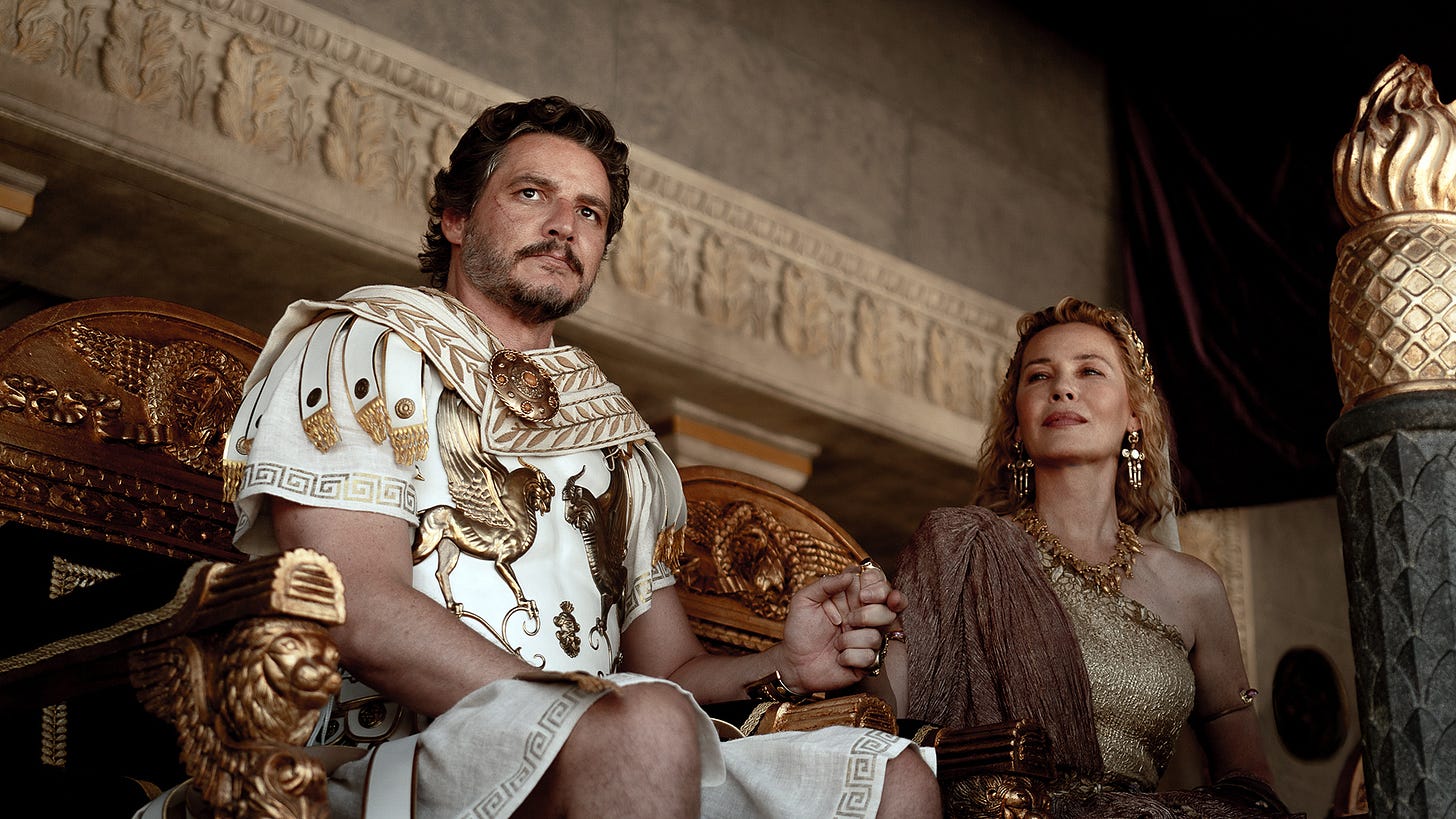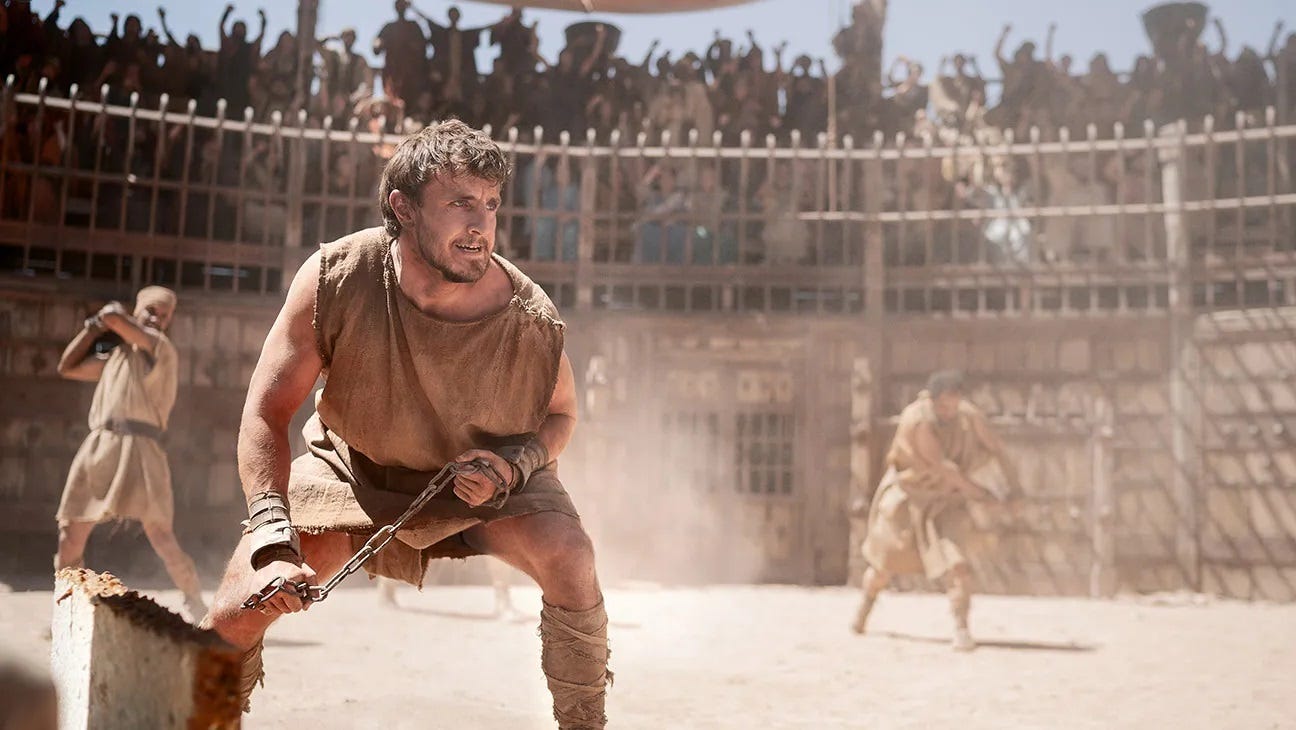Review: Gladiator 2
"Bread and circuses!"
"Bread and circuses!" wrote the Roman poet Juvenal (55–135 AD) in his Satires, referencing the Roman elite’s practice of providing free bread and large public spectacles—gladiator battles, chariot races—to pacify the masses and make them forget that they had long since traded away their political freedom.
The term "bread and circuses" is more than a metaphor for spectacle without substance; it speaks to the way distractions can pacify and sidetrack the public from issues of real importance. That’s a fitting description for Gladiator II, a "legacy" sequel to the now 24-year-old classic Gladiator (2000), which won five Oscars, including Best Picture and Best Actor for Russell Crowe.
The original Gladiator was a unique film. Sure, there had been many films about the Roman Empire before it, but Ridley Scott’s masterpiece set a new standard and even sparked a wave of imitators in the years that followed. Few, however, managed to capture its magic. As I write this, I can clearly picture Russell Crowe saying to the late Oliver Reed: “I will win the crowd. I will give them something they have never seen before.” Seeing Gladiator in theaters back then was one of my most memorable movie experiences.
So, why "bread and circuses"? I could certainly write at length about the first Gladiator, but let’s turn our focus to Ridley Scott’s latest film. Gladiator II is what we call a legacy sequel: a follow-up that arrives decades after the original, with new actors but a familiar storyline. We’ve seen a lot of this lately with Ghostbusters, Jurassic World, Beetlejuice, and so on. It might feel like Hollywood is running out of new ideas, but the reality is that they’re banking on safe nostalgia, especially in an industry grappling with pandemics, strikes, and financial pressures.
“Bread and circuses” was my immediate thought when I first watched the Gladiator II trailer. As a fan of the original, I was skeptical, but my fascination with Roman history drew me in. So, I sat down, played the trailer on YouTube—and out came hip-hop from Ye and Jay-Z, alongside Denzel Washington with a New York accent. The visuals looked familiar, but I had a sinking feeling. I wasn’t alone; many online fans felt the same, and the trailer was soon revised and improved on YouTube.
I get that it’s hard for studios to pull in today’s younger, attention-deficient audience, but especially with nostalgia-heavy films like this, it’s wise not to alienate those who actually remember the original.
But now, to the film itself (I mean it this time): Gladiator II is set, if I remember correctly, about 12 years after the events of the first film. The Roman Empire, now ruled by the two emperor brothers, Geta (played by the fantastic Joseph Quinn) and the volatile Caracalla (played by Fred Hechinger), is quashing the last remnants of resistance. In Nubia, the warrior Hanno (Paul Mescal) leads a desperate defense against the Roman general Marcus Acacius (Pedro Pascal).
Hanno, who turns out to be Lucius Verus, son of Lucilla (Connie Nielsen) from the first film, is captured and sent to Rome to train as a gladiator under the brutal manager Macrinus (Denzel Washington). Meanwhile, General Acacius, Lucilla, and other senators are plotting to use the army to overthrow the unpopular emperors and restore power to the senate and the people.
If you’ve seen Gladiator from 2000, you can probably guess how this one plays out. While it has new characters, the plot follows the same beats. Our protagonist suffers tragedy, gets captured, sent to Rome, and becomes central to the city’s power intrigues. We get multiple arena fights, each more spectacular than the last, including one scene where the Colosseum is filled with water, boats, and even sharks. It’s said they actually did this in ancient times—the sharks might be more debatable.
Gladiator II works best in its first half but unfortunately loses focus as the story progresses. There are too many loose threads and unclear motivations, and several times I thought the film could have used another round in the editing room. It’s also a shame that Hans Zimmer, who composed the iconic score for the first film, isn’t back.
For all the action scenes and spectacular landscapes this film offers, it’s hard to ignore that, compared to the original Gladiator, this one really is just "bread and circuses." It’s impressive, it has grand scenes, and it’s undeniably epic, but it lacks the soul and depth that made the first movie so iconic and timeless. Much of this likely comes down to the extraordinary performances in the original that Gladiator II just doesn’t match. None of the actors here, except perhaps Pedro Pascal in certain scenes, come close to Russell Crowe, Joaquin Phoenix, or Djimon Hounsou.
I know, those are big shoes to fill. But when Gladiator II leans so heavily on its predecessor, the comparison becomes inevitable. I mean, Ridley Scott even uses clips from Gladiator in this sequel, practically inviting the comparison.
On its own, Gladiator II is a solid historical action film. It offers epic battle scenes, spectacular scenery, and intricate conspiracies. It gets a bit messy and theatrical at times, and it’s very much a Ridley Scott film, but overall, it’s entertaining enough.




